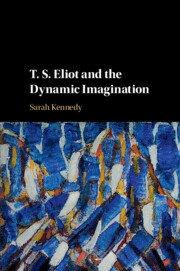Book contents
- T. S. Eliot and the Dynamic Imagination
- T. S. Eliot and the Dynamic Imagination
- Copyright page
- Epigraph
- Contents
- Acknowledgements
- Abbreviations
- Introduction
- Part I Sea Voices: Eliot’s Tempest
- Part II Broken Images: Illuminating Time and Space
- Part III Things Dying and New Born: Gestation and Resurrection
- Afterword
- Works Cited
- Index
Chapter 1 - Immersion
Eliot, James, and Shakespeare
from Part I - Sea Voices: Eliot’s Tempest
Published online by Cambridge University Press: 05 April 2018
- T. S. Eliot and the Dynamic Imagination
- T. S. Eliot and the Dynamic Imagination
- Copyright page
- Epigraph
- Contents
- Acknowledgements
- Abbreviations
- Introduction
- Part I Sea Voices: Eliot’s Tempest
- Part II Broken Images: Illuminating Time and Space
- Part III Things Dying and New Born: Gestation and Resurrection
- Afterword
- Works Cited
- Index
Summary
- Type
- Chapter
- Information
- T. S. Eliot and the Dynamic Imagination , pp. 23 - 51Publisher: Cambridge University PressPrint publication year: 2018



